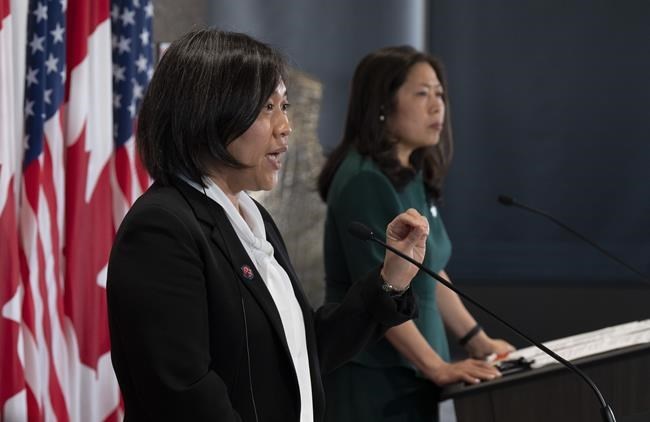WASHINGTON — North America's trading partners are in Cancun for two days of meetings to take stock of the last three years under the U.S.-Mexico-Canada Agreement.
International Trade Minister Mary Ng is sitting down with U.S. Trade Representative Katherine Tai and Raquel Buenrostro, Mexico's economy secretary — the "three amigas," as Ng calls them.
Tai's office says the U.S. exported nearly US$790 billion in goods and services under the trade deal in 2022, 31 per cent more than in 2012.
The U.S. Department of Commerce estimates North American exports supported some 2.1 million jobs in 2021.
All three sides will likely be thinking about the agreement's six-year review clause, which requires a comprehensive assessment of the deal by June 2026.
But Ng says rather than hearing a ticking clock, she hopes both Mexico and the U.S. seize their chance to ensure the deal survives well into the future.
The USMCA, known in Canada as CUSMA, is "the most successful in the world," Ng said Wednesday from Mexico City, where she was meeting with women-owned businesses to talk about its impact.
"This agreement, as negotiated, provides both predictability and stability for 16 years, to 2036," she said.
"These regular check-in points, including the one in 2026, are an opportunity to create even more certainty to extend the agreement beyond 2036."
Canada and Mexico are also keen to hear more about whether the U.S. will abide by a tribunal ruling earlier this year that rejected how it classifies foreign automotive content.
For Ng, that question has been "on the top of my desk" for months, and underscores one of the most vital aspects of an international trade agreement: that all parties abide by the terms.
"The rules that underpin all of us through this agreement are rules that we all value, and that we all must respect," she said.
"We are also all working to fight climate change — and the auto sector has a really important part to that, which is electric vehicles — and making sure that we are creating stability and certainty for the sector."
The dispute panel's decision, released in January on the heels of the North American Leaders' Summit, declared the U.S. interpretation of foreign content rules for autos "inconsistent" with the terms of the deal.
The USMCA increased the allowed "regional value content" for automotive parts to 75 per cent, up from 62 per cent, as part of an effort to give all three countries a bigger piece of each other's auto manufacturing sector.
In a core component such as an engine, the long-standing concept of "roll-up" allows such a part to be considered as having 100 per cent North American origins once the regional threshold of its various elements is met.
It's an essential step to determine which vehicles are deemed duty-free. The U.S. had tried to argue for a more rigid interpretation of the agreement's language, but the panel rejected that argument outright.
Since then, the U.S. has been largely silent on how it intends to respond, and officials in Tai's office offered no clues during a telephone briefing Wednesday about whether the meetings would produce any clarity.
"We are engaging with Mexico and Canada on finding a positive solution," said one official, speaking on condition of anonymity under the terms of the call.
"We want to find one that will benefit all the parties and stakeholders by enhancing North American motor vehicle production and jobs."
Officials also said two persistent U.S. points of contention — Mexico's production of genetically modified corn and Canada's rigidity on dairy export quotas — remain high on the priority list for all three parties.
However, they are all subject to separate dispute resolution efforts, which remain the primary vehicle for resolving them, the official said.
This report by The Canadian Press was first published July 6, 2023.
James McCarten, The Canadian Press

